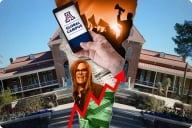You have /5 articles left.
Sign up for a free account or log in.
Two top providers of back-office software in higher education announced on Friday that they will join forces, pending regulatory approval.
Datatel and SunGard Higher Education help colleges manage their financial, human resources, fund-raising, and student data systems. Under a new agreement, the private equity firm Hellman & Friedman, which owns Datatel, plans to buy SunGard Higher Education from its parent company, SunGard Data Systems, for $1.775 billion. Hellman & Friedman would then meld Datatel and SunGard Higher Education into one company under a new, yet-to-be-decided name.
In press releases, the companies took an enthusiastic, bigger-is-better tack, promising “centralized development of targeted common functionality” aimed at promoting the “best practices of each company.” They also touted the benefits of “an expanded knowledge-sharing community,” which would encompass a combined client list of more than 2,000 education-oriented institutions.
Vendors such as Datatel and SunGard have grown in profile and profitability as data management has become a crucial part of running a modern university. Very few institutions manage their back offices with homegrown systems, and the open-source movement, while it has spread to the enterprise resource planning (ERP) realm, has not caught on there like it has for online learning platforms. According to recent data from Educause, Datatel and SunGard compete primarily with Oracle/PeopleSoft and Jenzabar for licensing back-office software systems.
Based on those data, the merger should leave the new SunGard/Datatel company with more than 50 percent market share for most kinds of data management software at most types of institutions.
For customers, the implications of Friday’s deal are not immediately clear. In the care of a private equity firm, the new company will probably not be allowed to carry a lot of extra fat, said Barbara Brown, president of EduServe International, a consulting firm that specializes in ERP software and is not attached to any particular company.
That means current clients using either company’s software can expect their tools to change over time if the new company elides elements of SunGard’s Banner and PowerCampus products and Datatel’s Colleague product, Brown said.
Bringing those customers under the same roof will be a delicate undertaking, said Brown — one that may cause friction with clients who are accustomed to the look and feel of a particular system. Asked whether there might be changes in the offing, both companies offered reassurances that they will not risk alienating existing customers. "Keeping customers happy is our number-one priority," said Datatel spokesman Robert Martin. "... We will continue to deliver on the development plans we have committed to customers." Said Michelle Reed, a senior vice president of product management and marketing at SunGard: "We will protect our customers' investments."
The merger is unlikely to create huge ripple effects anytime soon, several observers said. Because they are expensive, complex, and take years to select and install, back-office data management systems have longer life cycles than other types of campus technology. Therefore, customers of Datatel and SunGard Higher Education are unlikely to bolt for competitors due to anxiety, said Kenneth C. Green, director of the Campus Computing Project.
The merger could be “a catalyst for campuses to look at other options over the next several years, as they wait for the new company to name itself, organize itself, and make definitive statements about its applications,” said Green, who also designs surveys and blogs about technology for Inside Higher Ed. “But nothing is going to happen overnight.”
Michael Richichi, director of computing and network services at Drew University, agrees. Drew is in the middle of a two-year implementation of SunGard’s Banner product, so learning of the sale was “a little weird,” Richichi said. “But I have no reason to believe that anything is going to change in the near term.”
Because SunGard and Datatel serve comparable chunks of the markets where they compete, the new company would be unwise to impose much change on the customers of either one, said Green.
Still, Brown said she would advise her higher ed clients to be on guard against marginal changes in price and service over the next three to five years. To the extent that its private-equity overseers will be looking to build a lean operation and achieve economies of scale through the merger, the new company will probably be smaller than the sum of its parts, she said.
“Be cautious about signing new contracts, and make sure you’re in a position to negotiate new maintenance contracts,” said Brown. “[And] look at response time on help calls.”
For the latest technology news and opinion from Inside Higher Ed, follow @IHEtech on Twitter.








